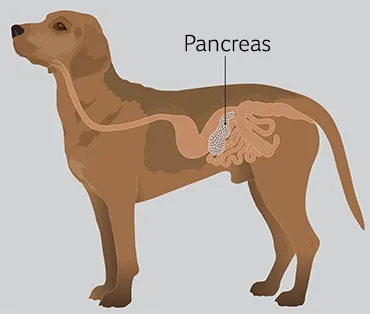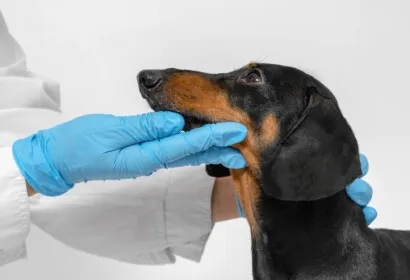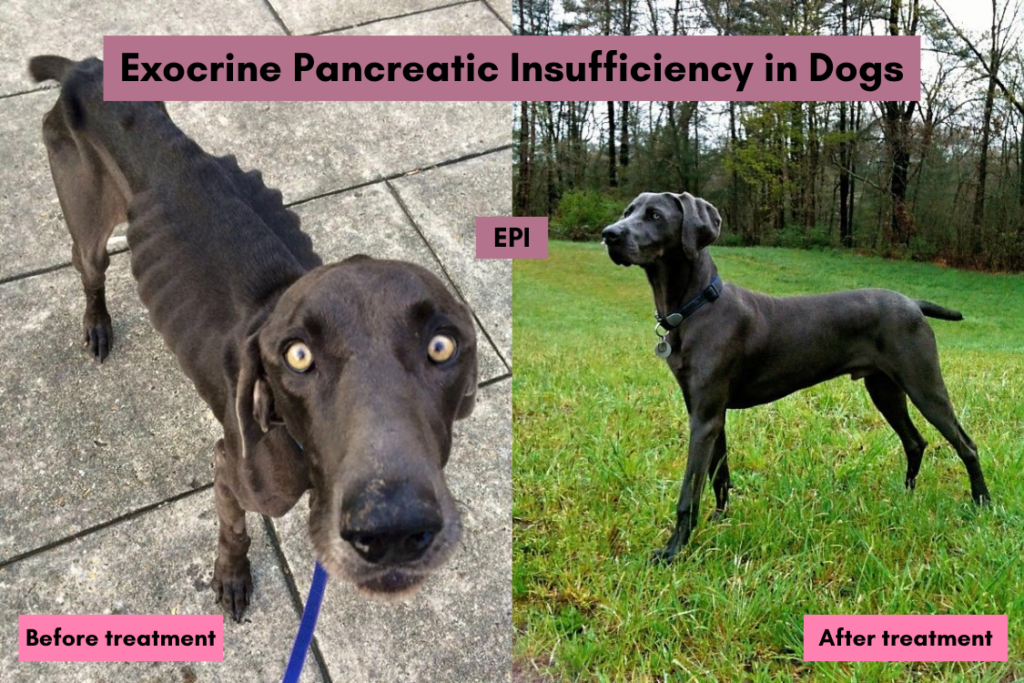What is Exocrine Pancreatic Insufficiency (EPI)?
Exocrine Pancreatic Insufficiency (EPI) is a serious condition in dogs where the pancreas doesn’t produce enough digestive enzymes. These enzymes are vital for breaking down food, particularly proteins, fats, and carbohydrates, which dogs need to stay healthy. Without these essential enzymes, dogs can experience a range of digestive problems, leading to malnutrition, weight loss, and other complications.
This article explores the symptoms, causes, and diagnosis of EPI in dogs, providing crucial information for pet owners.
Understanding the Role of the Pancreas in Digestion

Before diving into EPI, it’s essential to understand the pancreas’s role in a dog’s digestive system. The pancreas is a gland located behind the stomach that produces both insulin (which helps regulate blood sugar) and digestive enzymes. These enzymes help break down food so that nutrients can be absorbed into the bloodstream.
When the pancreas isn’t functioning properly, the body can’t absorb enough nutrients from food, which leads to malnourishment. This is what happens in dogs suffering from EPI.
Symptoms of Exocrine Pancreatic Insufficiency in Dogs

Recognizing the symptoms of EPI early is crucial for effective treatment. While not all dogs with EPI will show all symptoms, there are several signs to look for.]
- Chronic Diarrhea and Steatorrhea
Dogs with EPI often suffer from chronic diarrhea, which may contain undigested food particles. This is often referred to as steatorrhea, which is the presence of fatty stool, giving the feces a greasy or shiny appearance. - Weight Loss Despite Normal Appetite
One of the hallmark symptoms of EPI is weight loss despite a normal or even increased appetite. Since the body isn’t absorbing enough nutrients, the dog may appear to be eating well but still loses weight. - Excessive Gas and Bloating
Dogs with EPI often experience excessive flatulence and bloating due to the undigested food fermenting in the intestines. This can lead to discomfort and a distended belly. - Coat Quality Deterioration
A dog suffering from EPI may experience dull, thinning fur or hair loss due to a lack of nutrients. Essential fatty acids and proteins are often not absorbed properly, leading to poor coat health. - Vomiting
Some dogs with EPI may vomit as their digestive system struggles to process food. This can be a secondary symptom related to digestive distress.
Causes of Exocrine Pancreatic Insufficiency in Dogs

EPI can result from various factors that affect the pancreas’s ability to function properly. Some of the most common causes of EPI in dogs include:
- Chronic Pancreatitis
Inflammation of the pancreas, known as pancreatitis, is a leading cause of EPI. When the pancreas is repeatedly inflamed, its ability to produce digestive enzymes can be compromised, leading to EPI.
Tip: Top 4 Best Digestive Enzymes Supplements
- Genetics
Certain dog breeds are more predisposed to EPI due to genetic factors. Breeds such as German Shepherds, Rough-Coated Collies, and Chow Chows have a higher incidence of EPI compared to other breeds. - Pancreatic Acinar Atrophy (PAA)
This is a condition where the pancreatic cells responsible for producing digestive enzymes gradually deteriorate. This condition is often inherited and can lead to a severe form of EPI. - Pancreatic Cancer or Tumors
Tumors or cancer affecting the pancreas can interfere with enzyme production and cause EPI. Although less common, this is a possible cause of the condition in older dogs. - Infection or Other Diseases
In rare cases, infections or other diseases affecting the pancreas, such as parasites or bacterial infections, can lead to EPI.
Diagnosing Exocrine Pancreatic Insufficiency in Dogs

If you suspect your dog has EPI, it’s important to consult a veterinarian for a proper diagnosis. Several tests can help confirm the condition.
- TLI (Trypsin-Like Immunoreactivity) Test
The TLI test is the gold standard for diagnosing EPI in dogs. It measures the level of trypsinogen in the blood, an enzyme produced by the pancreas. Low levels of trypsinogen indicate EPI. - Fecal Fat Test
A fecal fat test can be used to detect the presence of undigested fats in your dog’s stool. This can help confirm malabsorption issues that are often associated with EPI. - Ultrasound or X-Rays
Imaging tests may be used to rule out other potential causes of digestive issues, such as tumors or other pancreatic diseases. These tests are typically used when other conditions need to be excluded. - B12 and Folate Blood Tests
Dogs with EPI often have low levels of vitamin B12 and folate due to poor absorption of these nutrients. Measuring the levels of these vitamins in the blood can provide additional evidence of EPI.
Living with Exocrine Pancreatic Insufficiency

While EPI is a lifelong condition, with proper management, most dogs with EPI can live a normal, happy life. Regular vet visits, appropriate enzyme supplementation, and a balanced diet will go a long way in keeping your dog healthy.
Pet Parent Tip: While managing EPI is mainly medical, consistent routines and stress-free mealtimes can support your dog’s overall well-being. If your pup struggles with anxiety or behavior around food, an online dog training program can be a helpful supplement to their care routine.
When to Seek Treatment for EPI

If your dog has been diagnosed with EPI, early treatment is essential. While the diagnosis can be overwhelming, it’s important to know that EPI is manageable with proper care. Seeking treatment for EPI involves enzyme supplementation, dietary changes, and ongoing monitoring to ensure your dog is absorbing the nutrients they need.
EPI treatments typically include enzyme replacement therapy and may require adjustments to your dog’s diet to support their digestive health.
Managing EPI for a Happy, Healthy Pup

Exocrine Pancreatic Insufficiency can be a challenging condition for both you and your dog, but with the right approach to diagnosis, treatment, and care, your dog can continue to live a happy and fulfilling life. Always work closely with your veterinarian to develop the best treatment plan for your dog’s individual needs, and don’t hesitate to reach out for additional support if needed.
If you suspect your dog may be suffering from EPI or if they show any signs of digestive issues, don’t wait—get them checked by a veterinarian right away. Early diagnosis and intervention can make all the difference.
Bonus Tip:
Managing EPI can mean surprise vet bills and ongoing care. Pet insurance helps ease the cost—but not all plans are equal. Compare pet insurances to find one that covers chronic conditions like EPI, so you can focus on your pup’s health, not the expenses.



